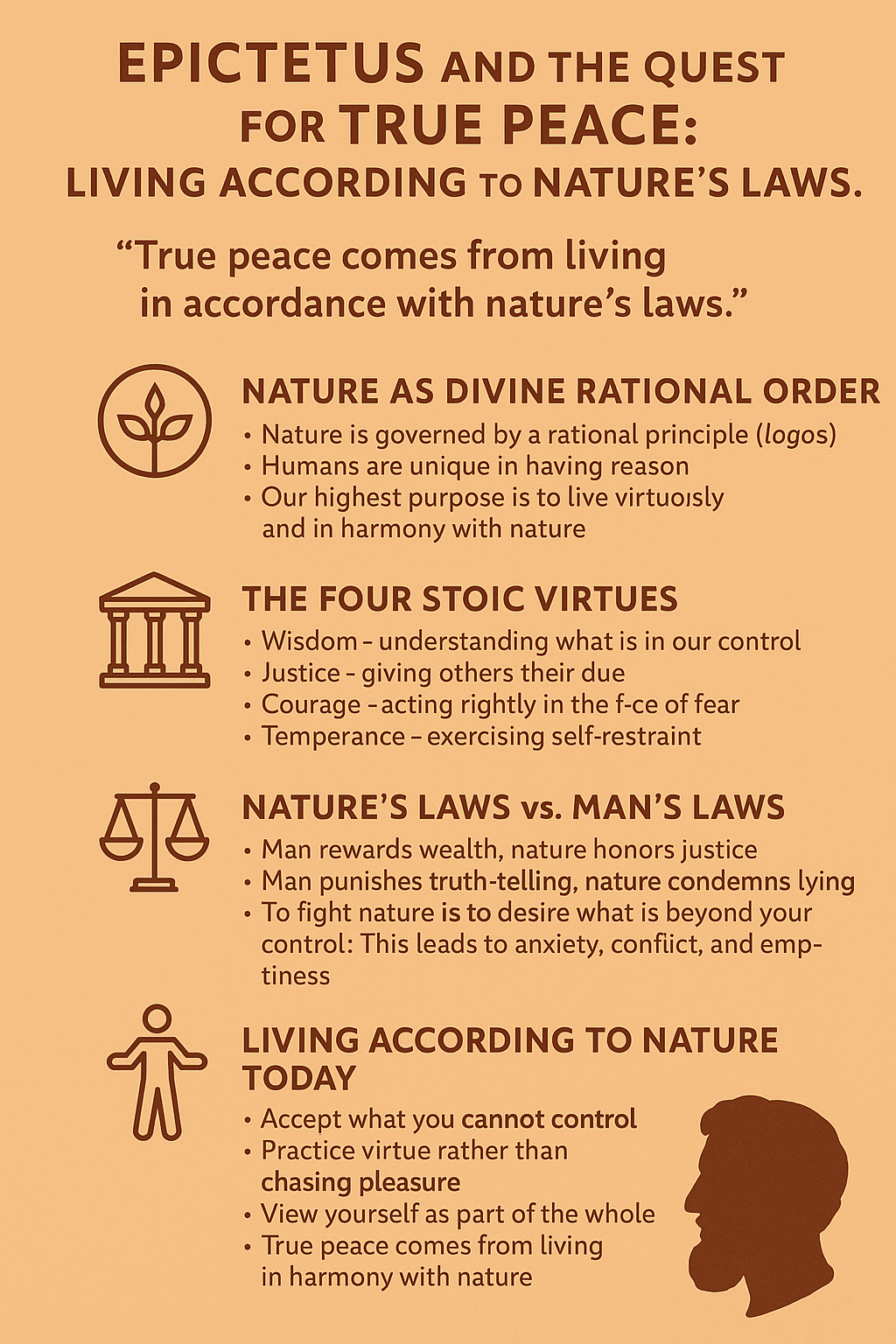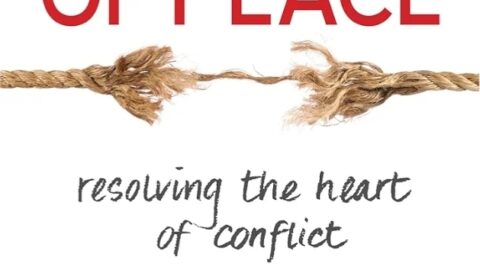Introduction: What Does It Mean to Live According to Nature?
When Epictetus, the Stoic philosopher, said “True peace comes from living in accordance with nature’s laws,” he echoed one of the central pillars of Stoic philosophy. To the Stoics, nature was not just trees and rivers—it was a divine rational order, the logos, that governed all existence. To live in accordance with nature was to live in harmony with the design, reason, and virtue built into the universe.
This article unpacks what Epictetus and the Stoics meant by “nature’s laws,” how these differ from modern interpretations of natural law, and why peace can only be found by aligning our lives with these fundamental truths.
I. Stoic Foundations: Nature as Divine Rational Order
1. Nature = Logos (Universal Reason)
In Stoic philosophy:
- Nature is not random or chaotic—it is rational and purposeful.
- The Logos is the divine reason that permeates the cosmos.
- Everything in nature fulfills its role in accordance with this logic—except man, who has free will.
Thus, to live according to nature is to live rationally, virtuously, and harmoniously, in alignment with that cosmic order.
2. Human Nature = Reason and Virtue
Humans are distinct because:
- We have reason (our unique nature).
- Our highest function is not pleasure or power, but living virtuously.
- Just as a fig tree’s purpose is to bear figs, a human’s purpose is to embody wisdom, courage, justice, and self-control.
Epictetus: “What is your profession? To be a good man.”
II. The Four Stoic Virtues: The Laws of Human Nature
Living in accordance with nature is not about obeying instinct, but perfecting reason through four cardinal virtues:
- Wisdom – seeing things clearly and understanding what is in our control.
- Justice – acting fairly, giving others what they are due.
- Courage – facing difficulty with strength and dignity.
- Temperance – restraining desires, living in moderation.
These are not optional moral ideals—they are the natural laws of the human soul.
III. Nature’s Laws vs. Man’s Laws
Epictetus and other Stoics warned that man’s laws often diverge from nature’s laws:
- Man rewards the rich, nature honors the just.
- Man punishes the truth-teller, nature condemns the liar.
- Man exalts power, nature cherishes self-mastery.
To chase wealth, fame, or revenge is to fight nature. That conflict breeds anxiety, disappointment, and spiritual disease.
“You are not disturbed by events, but by your judgments about them.” – Epictetus
IV. What Happens When We Live Against Nature?
- We desire what we cannot control – leading to fear and frustration.
- We try to bend others to our will – leading to conflict.
- We pursue pleasure as a good in itself – leading to addiction and emptiness.
- We envy, resent, or despair – because we expect the world to serve us, not to serve truth.
This is why peace eludes modern man—he has forgotten his nature.
V. What Does It Mean to Live According to Nature in Today’s World?
1. Accept What You Cannot Control
- Weather, traffic, illness, politics—outside your control.
- Response, attitude, choices—within your control.
2. Master the Inner Life
- Don’t outsource happiness to external events.
- True peace comes from character, not circumstances.
3. Practice Virtue, Not Vanity
- Seek wisdom, not approval.
- Do the right thing, even if no one sees it.
4. See Yourself as Part of the Whole
- You are not the center of the universe.
- You are a thread in a divine tapestry. Live your part well.
“Don’t seek for things to happen the way you want them to. Rather, wish that what happens happen the way it happens, and you will be happy.” – Epictetus
VI. Epictetus’ Peace: The Inner Kingdom
When Epictetus speaks of true peace, he means ataraxia—a state of unshakable tranquility that comes not from escaping hardship, but from living rightly in the midst of it. This peace is not given by the world, and it cannot be taken by the world.
It is earned by aligning your soul with nature’s moral architecture.
Conclusion: Nature’s Laws Are Not Optional
To Epictetus, peace is not an emotional state—it is a moral consequence. It is what happens when a human being fulfills their nature by living:
- rationally, not reactively
- virtuously, not vainly
- humbly, not proudly
- in harmony with the world, not at war with it
The world may rage around us. But the man or woman who lives by nature’s laws stands firm—because their peace is built on the eternal, not the fleeting.
“No man is free who is not master of himself.”







